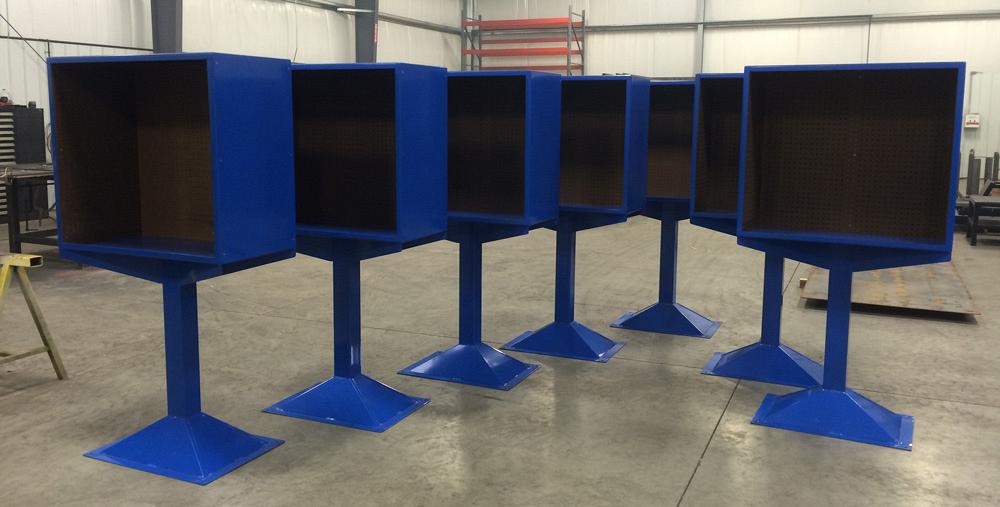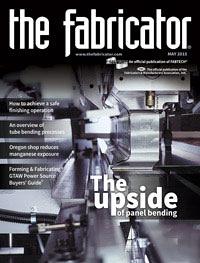Editor-in-Chief
- FMA
- The Fabricator
- FABTECH
- Canadian Metalworking
Categories
- Additive Manufacturing
- Aluminum Welding
- Arc Welding
- Assembly and Joining
- Automation and Robotics
- Bending and Forming
- Consumables
- Cutting and Weld Prep
- Electric Vehicles
- En Español
- Finishing
- Hydroforming
- Laser Cutting
- Laser Welding
- Machining
- Manufacturing Software
- Materials Handling
- Metals/Materials
- Oxyfuel Cutting
- Plasma Cutting
- Power Tools
- Punching and Other Holemaking
- Roll Forming
- Safety
- Sawing
- Shearing
- Shop Management
- Testing and Measuring
- Tube and Pipe Fabrication
- Tube and Pipe Production
- Waterjet Cutting
Industry Directory
Webcasts
Podcasts
FAB 40
Advertise
Subscribe
Account Login
Search
Talking about the next generation of fabricators
A small shop grows as more people choose to work with a family business
- By Dan Davis
- May 15, 2015
- Article
- Shop Management
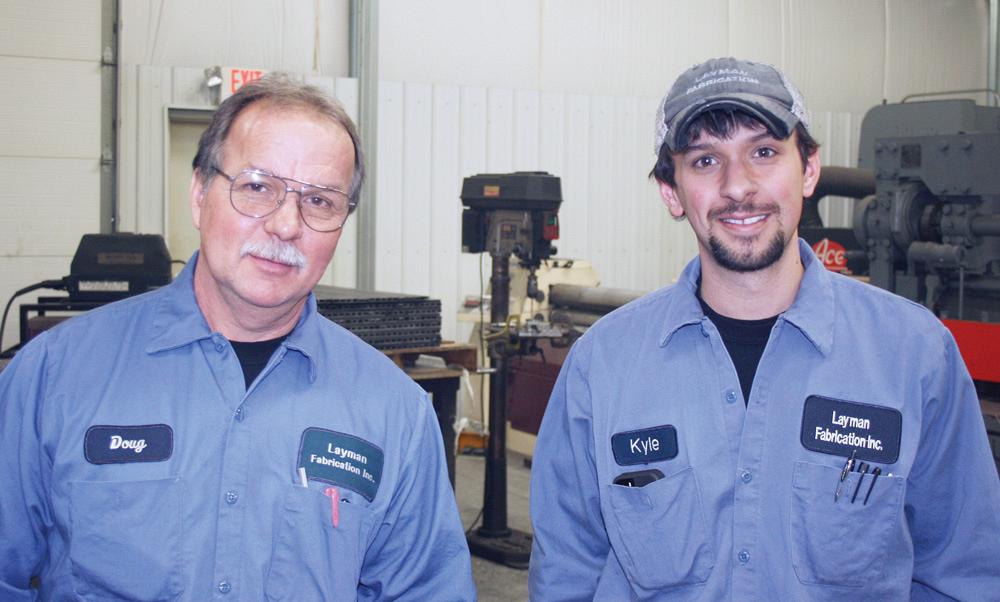
Figure 1
Doug and Kyle Layman have had no problem transitioning a father-son relationship into a professional work relationship.
Having a strong family is typically looked upon as a strength, but it might not be enough when it comes to business longevity.
According to the Harvard Business Review (HBR), some 70 percent of family-owned businesses fail or are sold before the second generation gets a chance to take over, and this dismal failure rate for family businesses is not limited to the U.S. In the January 2012 HBR article “Avoid the Traps That Can Destroy Family Businesses,” several foreign phrases are listed that describe this failure phenomenon:
In Brazil, Pai rico, filho nobre, neto pobre means “Rich father, noble son, poor grandson.”
In China, Fu bu guo san dai means “Wealth never survives three generations.”
In Italy, Dalle stalle alle stelle alle stalle means “From the stables to the stars and back to the stables.”
Maybe there’s some other saying in Indiana because Layman Fabrication Inc. in North Vernon is experiencing a family transition of another kind. The 23-year-old kid is energizing the small fabrication shop, with about $1 million in annual sales, and helping it to grow, and the dad is getting to spend more time in the business rather than working on the business. This transition doesn’t look to be in any jeopardy of dramatically changing course.
The dad who found a career in metal fabricating and raised his son up around his trade is finding out that family bonds are stronger than any outside influence that might unduly stress the growth of this family-owned business (see Figure 1).
Act 1: The First Generation
Doug Layman is a longtime resident of the North Vernon area. His dad was a do-it-yourselfer, and at his knees was where the 53-year-old first learned to weld.
Doug did a little painting in high school, but after graduation he took a job as a production welder for a nearby major manufacturer of transit buses. From there he moved on to become a second-shift production welder for a maker of exhaust systems. The money was good, but he didn’t like standing in one spot all shift long.
After about five years, the union workers at the exhaust system manufacturer went on strike, so Doug went looking for something else to do. After a short stint pouring concrete, he was hired at an industrial fabrication shop. He had found his calling.
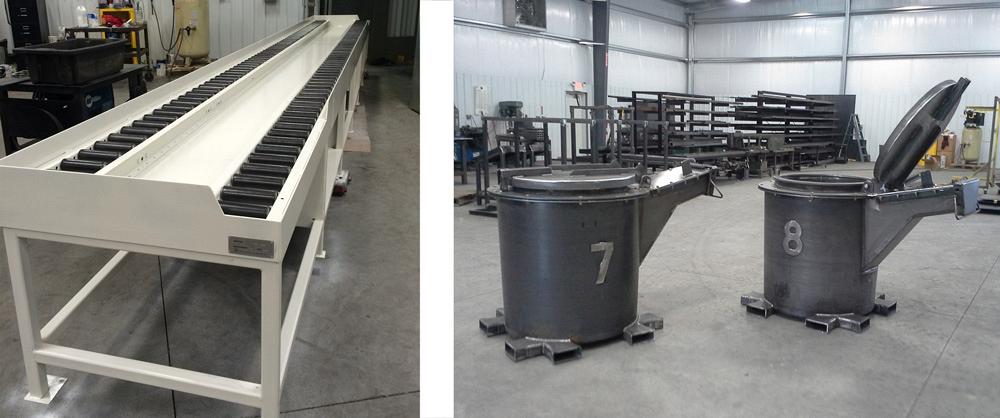
Figure 2 and 3
(left) This conveyor is an example of the industrial projects that make up the fabrication work for Layman Fabrication. For more intricate jobs, Doug or Kyle Layman visits the industrial customer’s facility to assist in compiling the proper specifications for the fabrication work.
(right) Although the company does not fabricate pressure vessels, it does build a variety of tanks and containers for its industrial clients.
He worked for this small fabrication shop for 16 years. Toward the latter part of his tenure there, Doug noticed that the owner wasn’t as engaged in the business as he had been several years before. Doug might have had a chance to purchase the business then, but he didn’t want to make that type of an investment. If anything, he wanted to invest in himself.
“I pulled the trigger on Jan. 1, and I had a P.O. on Jan. 2, 2003,” said Doug. Layman Fabrication Inc. was up and running in an old turkey barn behind the house.
At this time Kyle Layman was still in school. Even then he knew he wanted to be a fabricator. When he got into high school, he was even more convinced about his chosen career path—even as some teachers told him that he needed college if he were to be a success in life.
Act 2: The Second Generation
Kyle had grown up hanging out with his dad and learning the basics of fabrication. He learned to weld at age 10 in the industrial fabrication shop where his dad worked, and by 12 he was going to the salvage yard to look for old bed rails to fabricate weight-lifting equipment.
At Jennings County High School, Kyle worked for his dad part-time during the school year and full-time during the summer. When he turned 18, he was of age to enter the factories where his dad’s industrial fabrications were destined.
His senior year his class schedule allowed him to work in the afternoon. Luckily, he knew the owner of a fabrication shop in town, and that’s where he spent the fall of his final year of secondary education. He graduated with honors a semester early in 2009 and went to work for his dad.
“I’m glad he didn’t go to college because we wouldn’t be here right now,” Doug said.
“I’ve always wanted to own my own business, and I really enjoy fabricating,” Kyle added. “This is the path I chose.”
By becoming a two-man operation, Layman Fabrication was able to take on more work. By 2011 the father-son tandem decided the old turkey barn just didn’t offer enough room. The company needed another home. (For more details on this family construction project, see the sidebar “Raising a New Roof.”)
A year passed between breaking ground and wrapping up construction on the new Layman Fabrication building, and fabrication jobs kept coming.
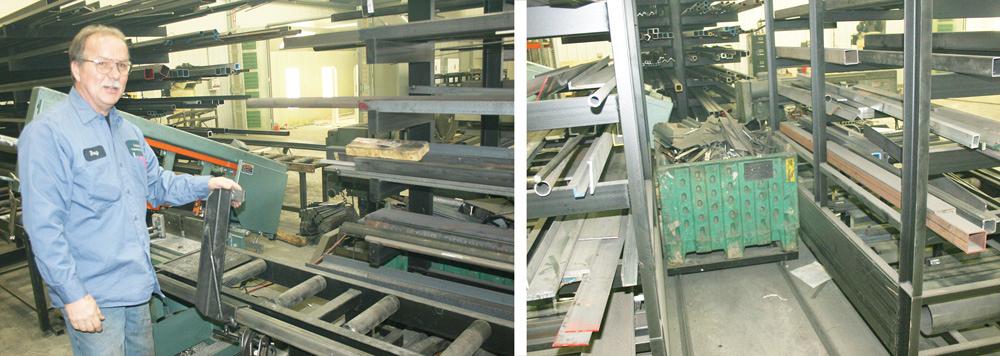
Figure 4
Like most small fabricating shops, Layman Fabrication doesn’t proclaim to be lean, but the staff does apply their own skills and ingenuity to create more efficient fabrication processes. Figure 4a shows Doug Layman in front of a saw that has a fabricated stop to assist the operator in quickly measuring tube stock to the appropriate length. A similar saw setup can be found on the other side of the material racks. Figure 4b shows the one scrap bin, which is located between the two sawing lines and sits on rails for ease of removal.
“We outgrew it almost instantly,” Doug said.
Specifically, a contract to build 500 containers for a nearby forging company was going to put them in a very tight squeeze on the family property. The 42- by 42-in. containers weren’t necessarily space-eaters individually, but if they were to be fabricated even in small groups, the Laymans were going to need a bigger manufacturing space.
Intermission: Stretching out in the New Space
In 2014 the company moved into its new 8,400-sq.-ft. facility in the Jennings County industrial park. It has plenty of room for fabricating a variety of industrial products, including carts, containers, conveyors (see Figure 2), platforms, tables, and tanks (see Figure 3). The company’s fabricating activities, such as cutting (see Figures 4a and 4b), are no longer right on top of each other.
An office with a desk is located to the left of the visitor’s entrance, or the unmarked door that this visitor happened to walk through. A table sits outside of the office for breaks. The rest of the facility is dedicated to fabricating.
Kyle said that the company’s floor has been filled since they moved into the shop. Word is spreading outside the shop’s base of about 15 primary customers as these companies are looking for a fabricator that can turn a 3-D CAD drawing or very basic guidelines into industrial products that fit the intended purpose.
Doug said that the longtime customers don’t necessarily have the engineers to create electronic drawings. That’s OK by him.
“I’ll go there or Kyle will, and we see what they need. We’ll make it happen,” Doug said. “It’s all just common sense.”
The small fab operation is actually seeing its work being exported overseas. It recently made some shadowboxes (see Figure 5), organizers in which manufacturing workers can neatly store their tools near their work area, for several companies, and one multinational company loved the fabrications so much that it ordered some for overseas sister companies.
Doug is quick to credit his son with the company’s recent growth. When he first joined the business, he represented an extra set of skilled hands, so growth was easy. Now, however, Layman Fabrication is a five-man shop, and Kyle is handling fabrication supervision, estimating, and customer relations, in addition to keeping his hands busy on the shop floor.
“What has helped a lot is that he started at the ground level. He knows how everything needs to be built,” Doug said. “He knows exactly what needs to happen on the shop floor.”
Meanwhile, Doug likes that he can devote his time to his craft—during the week and weekend.
“This is my man-cave. This is where I want to be,” he said.
Act 3: Future Generations
Kyle has his eye not only on the fabricators on the shop floor, but on future plans as well. He admitted that he’d ultimately like to run a 30-man shop. He’s on his way as the company has experienced 20 percent growth over the past couple of years and approaching $1 million in revenue for 2015.
The key to the growth is finding the right people. The nearby vocational school, Southeastern Career Center in Versailles, Ind., does a fine job of turning out welders, according to Kyle, but that doesn’t necessarily mean that these young people are fabricators. Welding is just one aspect of being able to build something.
On the other end of the spectrum are experienced workers who might come from a production environment where a successful day is measured in how many inches of welds they laid. Layman Fabrication isn’t looking for someone that wants to slap a part together and pass it along.
“You have to really take pride in what you do. This is what matters to us,” Kyle said.
They have been lucky enough to find good people with their early hires. For example, one of the most recently hired fabricators came from a major manufacturer of industrial equipment. Kyle said he actually has a longer commute to the North Vernon facility, but he enjoys the relaxed atmosphere and the variety of the work.
That mix of someone wanting to focus on their craft and being self-driven to improve upon it is the winning formula. That allows Kyle and Doug to meet with customers and spend time on what they like doing: fabricating.
“You have freedom here. You can call the shots. We give you the job, and you build it how you want,” Doug said. “In the end, it has to meet our quality standards.”
As the company grows, however, Kyle knows that he might have to spend more time on the business side of Layman Fabrication, working on more estimates and handling customer relationships. That’s not terrible news for someone who likes running a business almost as much as laying down a weld.
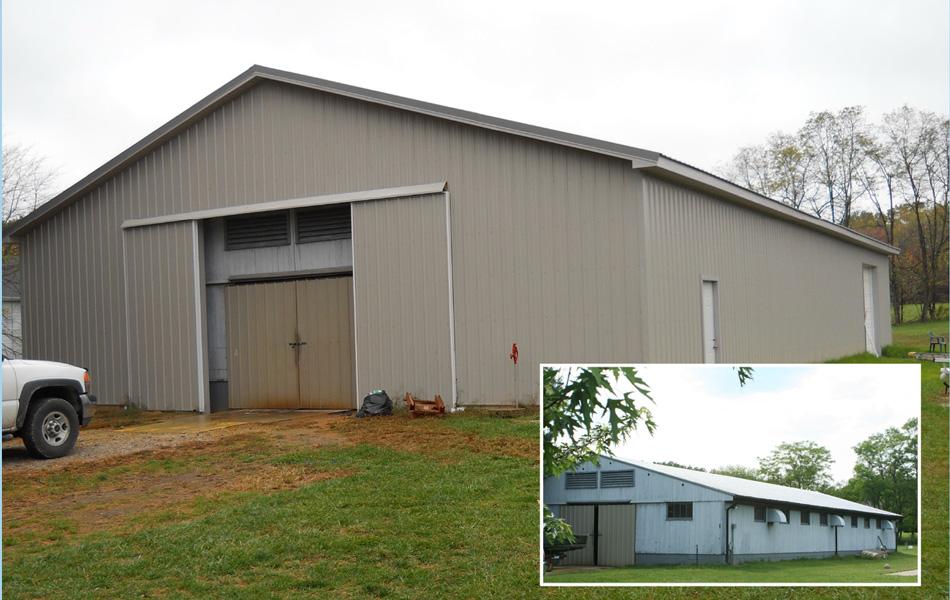
Raising a New Roof
Doug and Kyle Layman constructed a new building around the family’s old barn (inset) it had used to house its fabrication business.
Their current lot is 5 acres, enough to accommodate another building for material storage or more fabricating equipment. Betty, Doug’s wife and Kyle’s mom, might join the business as a full-time secretary in a couple of years when she retires from her babysitting job; she currently works on the company’s books in the evenings. Even Kyle’s sister Lacey has pitched in with the recent launch of the company’s website, the first public attempt of any kind for Kyle and Doug to share the word about Layman Fabrication.
“We love this. We eat and sleep this,” Doug said. A lifetime of family relationships sounds like it has built the foundation for a long-term business success story—for this generation and generations to come. Layman Fabrication Inc., 3435 N. 4th St., North Vernon, IN 47265, www.laymanfabricationinc.comRaising a New Roof
When Doug Layman of Layman Fabrication Inc. decided he needed a new building to house his expanding fabrication operations, he knew that he didn’t want two buildings on his property in addition to his home. The old turkey barn had proven suitable for the early days of the manufacturing business, but it just didn’t have the space necessary for him and his son to take on larger jobs.
That’s when he decided to build around the original barn.
They started building the framing for the new walls about 5 feet around the exterior of the front of the barn and the new section in the back of the old barn. When the frame went up, they tore the roof off the original building so that the new trusses could clear. When the roof was complete, they focused on completing the exterior walls.
As construction progressed in the evenings and on weekends, Layman Fabrication was still operating in the same footprint it had occupied for the previous decade. When work was done, the Laymans would move to the back and literally start walking parts of the old building out the backdoor.
With the old walls removed from the back of the building and the new interior finished with modern electric hookups and lighting, the fabricators moved their equipment into the new expansion. They then started clearing out and modernizing the front.
The entire transformation took about a year.
Little did the Laymans know that they would soon require even more space to accommodate growth of the business. Even with the business relocated off the family property, Doug Layman still believes the turkey barn transformation was worth it.
“To this day, it’s a really nice pole barn at home for me to park my lawn mower,” he said.
About the Author

Dan Davis
2135 Point Blvd.
Elgin, IL 60123
815-227-8281
Dan Davis is editor-in-chief of The Fabricator, the industry's most widely circulated metal fabricating magazine, and its sister publications, The Tube & Pipe Journal and The Welder. He has been with the publications since April 2002.
subscribe now

The Fabricator is North America's leading magazine for the metal forming and fabricating industry. The magazine delivers the news, technical articles, and case histories that enable fabricators to do their jobs more efficiently. The Fabricator has served the industry since 1970.
start your free subscription- Stay connected from anywhere

Easily access valuable industry resources now with full access to the digital edition of The Fabricator.

Easily access valuable industry resources now with full access to the digital edition of The Welder.

Easily access valuable industry resources now with full access to the digital edition of The Tube and Pipe Journal.
- Podcasting
- Podcast:
- The Fabricator Podcast
- Published:
- 04/16/2024
- Running Time:
- 63:29
In this episode of The Fabricator Podcast, Caleb Chamberlain, co-founder and CEO of OSH Cut, discusses his company’s...
- Trending Articles
Capturing, recording equipment inspection data for FMEA

Tips for creating sheet metal tubes with perforations

Are two heads better than one in fiber laser cutting?

Supporting the metal fabricating industry through FMA

Omco Solar opens second Alabama manufacturing facility

- Industry Events
16th Annual Safety Conference
- April 30 - May 1, 2024
- Elgin,
Pipe and Tube Conference
- May 21 - 22, 2024
- Omaha, NE
World-Class Roll Forming Workshop
- June 5 - 6, 2024
- Louisville, KY
Advanced Laser Application Workshop
- June 25 - 27, 2024
- Novi, MI
























